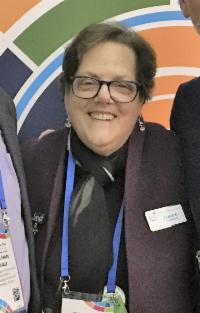
I am pleased to present this week’s D’var Torah. It is a wonderful opportunity for me to study ancient teachings and search for meaning…to today’s Reform Jews, to women, and even, personally to me. This week we read from the double portion Acharei Mot/K’doshim, the sixth and seventh portions in the book of Leviticus.
Adonai spoke to Moses after the death of the two sons of Aaron, who died when they drew too close to Adonai. Adonai said, "Tell your brother Aaron that he is not to come at will into the shrine behind the curtain, in front of the cover that is upon the ark, lest he die; for I appear in the cloud over the cover".
So begins Parashah Acharei Mot, and it continues with the description of the Tabernacle ceremony for the holy festival of the Day of Atonement, the general rules for sacrifice and sanctuary, and specific laws about permitted and forbidden sexual relationships. Hmmm…death for coming close to God…sexual relationships that barely mention women except as the dangers posed by their sexuality. My search for meaning will definitely need to go beyond the surface. But isn’t that what is most thrilling about the study of Torah?
The goal of the book of Leviticus is to shape the Israelites into a holy people and to safeguard the purity that it considers essential for contact with the holy. Leviticus depicts the world as a fundamentally ordered universe. When boundaries are not appropriately respected and the natural harmony is upended, a person can, and should, restore the world to its natural order. According to Leviticus, proper use of the sacrificial system, as well as the maintenance of detailed rules and ritual, provide the means to achieve restoration. In fact, K’doshim, deals specifically with the “holiness code,” defining through specific commandments what it takes to be holy.
Acharei Mot, in my mind, is about creating change, both as individuals and as a people, that will take root as fundamental values as a people. It begins with strict adherence to proscribed rules, until we are able to be holy almost without thinking. So often people tend to equate rules as creating barriers to self-actualization. Well, think about how we are living today, with our normal lives turned upside down due to physical distancing and requirements to shelter in place. So many people have told me that they were extremely stressed-out and simply could not figure out how to live in this new world. What helped almost every one of them was to create new routines and structures for their lives.
I would also suggest that we, as Reform Jews, have values that began in the rules of Leviticus. As Reform Jews we believe in interpretation and individual informed choice, but some values are embedded in our very core. I am sure we can all relate to our commitment as a people to tzedakah. It is in B’har, the second to last reading of Leviticus, where we are first instructed to support the disadvantaged in our community. Today Reform Jews are committed to both tzedakah and tikkun olam. URJ’s vision includes that “to be a Reform Jew is to hear the voices of the prophets in our head: to be engaged in the ongoing work of tikkun olam; to strive to improve the world in which we live.” And WRJ has defined three key strategies, pillars for our success, with a commitment to our shared values of sisterhood, spirituality, and social good.
I have been honored to serve on WRJ’s Board of Directors and in that capacity have seen very clearly how WRJ supports all of us in our efforts to do social good. As a member of WRJ’s Budget Committee I have been privileged to be on the team that recommends the dollars that are allocated for our YES Fund, that provides grants and financial support for youth, education, and special projects. Through those hundreds of thousands of dollars, as well as our collective action and voice through tens of thousands of women throughout the North America, we have been integral to founding NFTY, providing scholarships to clergy, and supporting Reform Jewish organizations throughout the world. Two months ago I participated in WRJ’s Women’s Journey to Israel and one of the highlights was actually visiting organizations that have been recipients of WRJ’s philanthropy. What a spiritual experience it was to pray at the Kotel with Women of the Wall and sisters from all over the world!
Are we supporting our Reform Jewish commitment to tikkun olam? Absolutely. But we are doing much more than providing financial support. We have been putting energy and muscle into championing women’s rights in religious practices and public policy through our advocacy efforts. WRJ has taken public stands on such issues as gender-based violence, pay equity, reproductive rights, immigration and refugee reform, and international and religious pluralism. And in partnership with the Religious Action Center of Reform Judaism, we have been at the forefront in the fight for Reproductive Health and Rights.
We as Reform Jewish women have been at the forefront of major efforts in repairing the world. I welcome you to join me in celebrating our continued commitment to tikkun olam.
Janet Buckstein is a member of Makom Solel Lakeside in Highland Park, Illinois where she is co-chair of their women’s group. She currently serves on the boards of URJ and WRJ, where she is Immediate Past President of WRJ’s Midwest District.
Related Posts

Parashat Yom Rishon shel Rosh HaShanah

Cultivating a Culture of Accountability and Belonging


